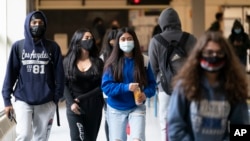All About America explores American culture, politics, trends, history, ideals and places of interest.
In spring 2020, Jahzeel Smith was a high school senior looking forward to giving the speech he was scheduled to deliver at graduation. But closures and cancellations forced by the COVID-19 pandemic did away with those plans.
“Anything senior year and freshman year of college, I was robbed,” says Smith, 21, of Baltimore. “I didn't experience any of that. No graduation, no prom, no senior week, no freshman week [in college], no campus living, no dorms. It was bad.”
Smith is a member of so-called Gen Z, the generation of young people born between 1997 and 2012, who range in age from 11 to 26. Sociologist Pamela Aronson says Gen Z has experienced a lot of disruption in their lives.
“These folks are the ones who came of age during the peak of the pandemic, and we've had a lot of financial insecurity, economic insecurity, social political insecurities, that have emerged since then,” says Aronson, a professor at the University of Michigan-Dearborn. “And so, a lot of these factors have shaped the world views, the opportunities, and also the insecurities, of Gen Z.”
Older adults have a lot to say about Gen Z. A recent survey found that 40% of employers prefer not to hire Gen Z workers because they find them to be ill-prepared for the workforce. Another poll found Gen Z is having more difficulty achieving work milestones than their parents did.
The notion that Gen Z workers are “soft” is one that Gabby DeAbreu, 22, is very conscious of in her job as a technology consultant in Virginia.
“I'm always very cognizant of not confirming that assumption or not validating those thoughts,” she says. “I try not to confirm that in a work setting or a professional setting. But at the same time, I don't agree with that assumption.”
Neither does Aronson, whose research focuses on the transition to adulthood. She says Gen Z faces more challenges in some ways than previous generations.
“There's a growth in inequality in the transition to adulthood. There's a lot of changes in culture and norms, insecurity more generally, in terms of climate change and the war and school shootings and rapid inflation. All these things put enormous pressures on this generation,” Aronson says. “And so, I take the opposite view, not that they're softer than previous generations, but they actually face way more obstacles and they get way less support.”
Support like the GI Bill, for example, which Americans returning from war could use to help cover the cost of a college education, something Smith can’t afford right now.
“I was in school, and I couldn’t complete because of financial problems,” says the 21-year-old, who now works as a neighborhood forestry technician, planting trees in Baltimore. “They sell it to us that you control your own destiny, you control your future, when that's not the case. There’s a lot of variables that go into it that are out of anyone's control, and you just have to deal with it. You got to play the cards you're dealt.”
Despite those challenges, Smith does hope to be financially stable and own property 10 years from now. Recent studies suggest that Smith’s guarded optimism is felt by many of his peers, who are hopeful about their futures but less so about the world.
“Gen Z is fairly pessimistic about the world. …They've gone through a lot of profound events, and they see the world as a lot more uncertain than perhaps generations before them,” says Matin Mirramezani, chief operating officer of Generation Lab, a data intelligence company that specializes in studying young people.
“It's a paradox in that they do see the world negatively, but they see their own lives very positively, and they have a good view of how their own lives will end up,” he said.
That’s the case for DeAbreu, who says she worries about overconsumption, climate change, women’s rights and limited options when it comes to presidential candidates. But when it comes to optimism about her own future?
“If I had to rate it, it's like an eight out of 10. I feel like I'm pretty optimistic,” she says. “I honestly expect to do better than my parents.”
Studies show that the issues Gen Z is most concerned about include health care, reproductive rights, the economy, environment and climate change, according to Mirramezani.
“We're seeing a lot more profound effects of climate change. We had the COVID pandemic, and now generative AI is changing things in a profound way. So, this is a generation that's just kind of constantly going through changes,” he says. “And I think it speaks to their resilience that they've been able to go through these changes and are still adapting.”
The 2023 “Stress in America” report by the American Psychological Association finds that Gen Z adults report higher stress levels than older adults. Lynn Bufka, a clinical psychologist affiliated with the APA, says part of the reason is that younger people are more comfortable identifying and acknowledging distress than people in previous decades.
“People have a language for describing how they're doing emotionally, mentally, psychologically in ways that we haven't always had as part of our day-to-day culture,” Bufka says. “But also, when we think about this particular cohort of individuals, I think we should not underestimate the impact of the pandemic.”
The pandemic forced today’s Gen Z adults to stay home with their parents during a time when they were supposed to be gaining age-appropriate independence, separating from their family, developing friend networks and their sense of self, according to Butka.
“Many of these things were not possible for individuals during the pandemic, so some of that normal developmental growth that we would expect may have been delayed for individuals in that time period,” she says.
The pandemic closures hit during DeAbreu’s freshman year of college.
“It was during my first freedom from my parents ... and during that year, I blossomed socially, and that was a big thing for me,” she says. “That social aspect was taken away. I felt like I reverted back a little bit to how I was when living with my parents.”
Gen Z also feels abandoned by older adults on a number of issues, according to Aronson.
“They felt that older adults didn't provide leadership through the pandemic. I think this also is reflected in climate change and the concern of young people feeling like many older adults are ignoring the problems of climate change and don't really see how things like gun violence in schools impact them.”
Aronson says mentoring programs and having clear expectations in both the classroom or workplace could be critical to helping young people who are struggling. She also suggests that companies offer training in both hard technical skills as well as soft skills, like teamwork, to help college graduates adjust.
Another factor that could be adding to Gen Z struggles, is social media, which previous generations did not have growing up. These popular online platforms can make distant world problems feel close to home.
“What's going on in the world is very much embedded in their life. And that's very different from in the past … how news was consumed. And that obviously has a dramatic effect on how people experience their lives,” says Mirramezani. “They see the big events in the world, and it feels very personal to them.”
Social media can also put pressure on young people who might feel they aren’t living up to what they see online.
“Social media is the bar. Social media sets the bar,” Smith says. “It used to be OK to be normal. Now, normal isn't OK after social media.”







